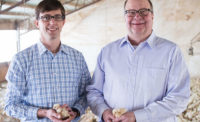Cover Story
Mission control: Mountain States Rosen acquisition furthers its position in the lamb industry
Mountain States Rosen accepted a rare opportunity to purchase JBS USA’s Greeley, Colo., lamb-processing facility — a move that improves its story of vertical integration and gives it the flexibility to expand its distribution and advance lamb further into the specialty-protein market.

Ernie Davis, COO, and Dennis Stiffler, CEO of Mountain States Rosen, stand in the holding pens at the company’s newly acquired Greeley, Colo., lamb-processing facility.

Dennis Stiffler (black helmet), CEO of Mountain States Rosen, shows Andy Hanacek (blue helmet), editor-in-chief of The National Provisioner, how the electronic grading system produces a tag with a yield and quality grade for each lamb carcass (next photo) at the Greeley lamb facility.

At Mountain States Rosen’s Greeley lamb facility, each lamb carcass has a tag with a yield and quality grade.

A Mountain States Rosen employee sorting lamb cuts into vacuum-skin packaging (VSP).

Mountain States Rosen began using vacuum-skin packaging (VSP) for its products years ago at the Greeley facility, a product it says has helped its customers and consumers.

Employees break down the lamb carcasses into various cuts on separate lines at the Greeley facility.

Employees break down the lamb carcasses into various cuts on separate lines at the Greeley facility.

Employees break down the lamb carcasses into various cuts on separate lines at the Greeley facility.








Paying attention to market trends can help companies plan for the future, and when a company has demonstrated years of leadership in its field, it increases the probability of success significantly when planned strategies are implemented.
Where lamb processing is concerned, the team at Mountain States Rosen (MSR) believed it needed to put itself in a better position to take care of its cooperative producer members and deliver lamb product to its customers — products the company views as specialty proteins, rather than commodity items.
Exclusive Video Q&AsCEO Dennis Stiffler discusses MSR's role in the lamb processing industry and future advancements in technology and food service strategies. Watch the video. COO Ernie Davis discusses the Shepherds Pie Program and how reaching out to bloggers and local chefs raised awareness of how to prepare lamb products. Watch the video. |
Since 1995, MSR had operated under an agreement to use the Greeley, Colo., lamb-processing facility owned by JBS USA (and its ancestor companies — Monford, ConAgra and Swift). JBS employees would accept the live animals into the facility and be responsible for handling, slaughter, cooler management and grading, after which MSR employees performed the remaining fabrication tasks. Both sides were satisfied with the agreement, says Dennis Stiffler, CEO of Mountain States Rosen, but it was a 20-year deal whose deadline was fast approaching in mid-2016. In assessing the future, Stiffler says, MSR realized a unique opportunity to take itself to the next level in lamb production.
“We felt very strongly that in order to continue to bring value to our cooperative producer members and customers, … we needed to have a little more control of our destiny,” he explains. “The ultimate part of that was to take over and control the slaughter process, and so for the last three years, we’ve been working on plans to see if we could make that happen.”
The market dynamics of the lamb industry played a significant role in the decision, as MSR needed to react to those changes, but didn’t feel it had control to do so without control over the harvest side of the business, Stiffler adds. Ernie Davis, COO of Mountain States Rosen, says the acquisition of the plant gives MSR the flexibility it needs to best address consumer and customer demands.
“There are different ethnic groups demanding different product, and those demographics are growing,” Davis says. “Controlling the slaughter portion of the plant opens up export channels for the variety meats, and now we can include muscle cuts to capture scale and grow export market share.”
Stiffler agrees that the plant now offers MSR the ability to follow trends more strictly in its product offerings.
“There’s a tremendous opportunity to appeal ... to changing demographics, whether through Hispanic markets or some of the emerging Middle Eastern populations that have come here through immigration, and [to] Millennials,” he says. “Obviously, Halal is a key opportunity, and it’s high on our priority list because we get asked about it frequently. We’ve had it from time to time, but we need to develop it further and make sure the authenticity is there.”
The deal for the plant closed on Jan. 5, 2016, and MSR reports that the transition went smoothly.
Stiffler and Davis agree that the lamb facility was in really great shape, a testament to JBS’s reputation as a company that invests and takes care of its assets. MSR offered all employees the opportunity to transition their jobs over to MSR, including all management, harvest-floor personnel, shipping and, in particular, the head of the JBS USA Lamb Division, Kevin Quam.
“We definitely wanted [Quam] to be part of the deal not only for his experience in the plant, but also he has a tremendous relationship with other producers out in the marketplace,” Stiffler says. “He brings an additional window of opportunity for us to build relationships with some sources of supply that we didn’t have before.”
Having control of the entire process allows MSR the opportunity to be more efficient as well, Stiffler adds.
“We will be able to put additional emphasis on source supply quality, which we lacked when we were purchasing carcasses outside of our cooperative producer members,” he explains. “That gives the fab operation the opportunity to provide a more consistent, uniform, quality product.”
Advancement unleashed
Although MSR believed it had to acquire the lamb plant in its entirety to further advance its business, it should be noted that the company had made significant improvements to its portion of the plant prior to the acquisition. Stiffler recounts the product-development advancements introduced by the company over the years: the butterflied leg of lamb and the easy-cut loin come immediately to mind as stalwarts of the industry that MSR pioneered. In recent years, MSR has continued to work on projectsthat help its customers and consumers, he says.
“The biggest thing a retailer deals with on this product is shrink, so anything we could do to help mitigate that is advantageous, and that’s why we’ve moved toward case-ready product,” he says. “VSP [vacuum-skin packaging] is one of those technologies already in place at the Greeley plant that really has allowed us to manage shrink and extend our shelf life to manage turns better.”
Additionally, Stiffler points out how the company developed a value-based grid-marketing system to improve the quality of the livestock supplied by its cooperative producer members, in which lamb producers are paid for producing top-quality animals rather than being paid on an average.
To assist in grading those lambs coming in, MSR last year installed a vision imaging, or electronic, grading system in the Greeley plant. Stiffler says the process has worked extremely well by more consistently grading lamb carcasses as compared to subjective evaluation.
“For lamb, marbling isn’t a factor, so the carcass is not ribbed, and the system is able to scan the carcass and provide a yield grade and a quality grade as well,” he explains. “The unique thing about lamb is, it can be done on the hot carcass.
“That’s going to give us a real advantage in improving the consistency and uniformity of product in a box, or selecting the right lambs to be in the case-ready program. It allows us to predict what our return from that carcass will be in terms of lean, salable meat,” Stiffler adds.
Davis appreciates the prospect of having more uniform, consistent product represented in the company’s offerings as well as the production efficiencies the electronic imaging brings to the table at the plant level.
“It gives us an opportunity to be more consistent, and it’s not just about having the best meat in the box or the tray, it’s also about it being consistent,” he says. “We’ve got the quality, we’ve got the supply, and we’ve got the technology now. When you have all those tools and can do a lot of different things for customers in that specialty category, you then have to make it easy for the retailers and give consumers what they want.”
MSR already had begun down the path of making lamb easier for its customers and consumers at its Bronx, N.Y., production facility through the expansion of the case-ready program program, led by David Gage, executive vice president of Sales. The next step for the newly acquired Greeley facility will be expansion of that program to cover the entire United States.
“Because we’ve done such a good job in New York of developing our case-ready footprint and growing the market east of the Mississippi, we think the same opportunity exists here in Greeley,” Stiffler says. “That’s a high priority, and it does involve quite a bit of capital investment and some renovation within the plant, but it can give our sales force a tool to grow our market.”
Davis sees expansion of the case-ready program out west as a big opportunity now that the company will be covering coast-to-coast customers with it.
“In order to be successful, you need to be close to the customers, able to provide them with multiple shipments [a week] to make sure they have fresh products and are turning it through,” he says. “It creates a partnership and trust with the retailers that we’re close, we’re going to do that work for them and they don’t have to think about it.”
Finally, for Davis, acquisition of the Greeley plant allows MSR to complete its story of vertical integration backed by quality. One of the larger initiatives he has begun to execute is solidifying MSR’s story to the marketplace.
“We need to retrain ourselves as a company, get out of the commodity mindset, that we’re here to get meat out the door because we’re not here for that,” Davis says. “We’re here to support American ranchers and our owners — the farmers and ranchers — and make sure that next generation is just as viable. We’re giving them a path to achieve that.”
In moving away from the commodity mindset, MSR has begun to develop connections with bloggers and food writers in the consumer marketplace, as well as offer innovative recipes using lamb in ways that touch on the relevant trends consumers want. More recently, MSR has cultivated relationships with professional fitness trainers, a group that appreciates homegrown lamb as a clean, lean, complete protein and has promoted it to help clients with workout optimization and recovery.
“Our immediate focus today is finding ways to increase lamb consumption and distribution,” Davis says. “We’ve got the ranchers, we’ve got the stories, and the consumers in this specialty-protein market want to know where the product comes from and are willing to spend more money to support it. They want to learn about it and make the connection.”
Stiffler points to data citing lamb as one of the few proteins in recent years that has grown in consumption, and he believes that, although “it’s not going to be exponential,” it is expected to continue to grow, particularly globally.
“There’s a lot of opportunity for lamb to grow,” he concludes. “There’s no reason [the industry] couldn’t double consumption of American lamb, based on where we’re starting.”
Having secured control of its supply chain by purchasing the Greeley plant, Mountain States Rosen certainly believes in the potential the lamb industry has moving forward. With MSR applying its innovative strategies to a much more flexible supply chain ought to help the lamb industry advance as a whole as well. NP
Looking for a reprint of this article?
From high-res PDFs to custom plaques, order your copy today!














